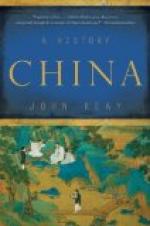Then there were the conditions in the capital itself. The struggles between cliques came to a climax. On the death of Shen Tsung (or Wan-li; 1573-1619), he was succeeded by his son, who died scarcely a month later, and then by his sixteen-year-old grandson. The grandson had been from his earliest youth under the influence of a eunuch, Wei Chung-hsien, who had castrated himself. With the emperor’s wet-nurse and other people, mostly of the middle class, this man formed a powerful group. The moment the new emperor ascended the throne, Wei was all-powerful. He began by murdering every eunuch who did not belong to his clique, and then murdered the rest of his opponents. Meanwhile the gentry had concluded among themselves a defensive alliance that was a sort of party; this party was called the Tung-lin Academy. It was confined to literati among the gentry, and included in particular the literati who had failed to make their way at court, and who lived on their estates in Central China and were trying to gain power themselves. This group was opposed to Wei Chung-hsien, who ruthlessly had every discoverable member murdered. The remainder went into hiding and organized themselves secretly under another name. As the new emperor had no son, the attempt was made to foist a son upon him; at his death in 1627, eight women of the harem were suddenly found to be pregnant! He was succeeded by his brother, who was one of the opponents of Wei Chung-hsien and, with the aid of the opposing clique, was able to bring him to his end. The new emperor tried to restore order at court and in the capital by means of political and economic decrees, but in spite of his good intentions and his unquestionable capacity he was unable to cope with the universal confusion. There was insurrection in every part of the country. The gentry, organized in their “Academies”, and secretly at work in the provinces, no longer supported the government; the central power no longer had adequate revenues, so that it was unable to pay the armies that should have marched against all the rebels and also against external enemies. It was clear that the dynasty was approaching its end, and the only uncertainty was as to its successor. The various insurgents negotiated or fought with each other; generals loyal to the government won occasional successes against the rebels; other generals went over to the rebels or to the Manchus. The two most successful leaders of bands were Li Tz[)u]-ch’eng and Chang Hsien-chung. Li came from the province of Shensi; he had come to the fore during a disastrous famine in his country. The years around 1640 brought several widespread droughts in North China, a natural phenomenon that was repeated in the nineteenth century, when unrest again ensued. Chang Hsien-chung returned for a time to the support of the government, but later established himself in western China. It was typical, however, of all these insurgents that none of them had any great objective in view. They




